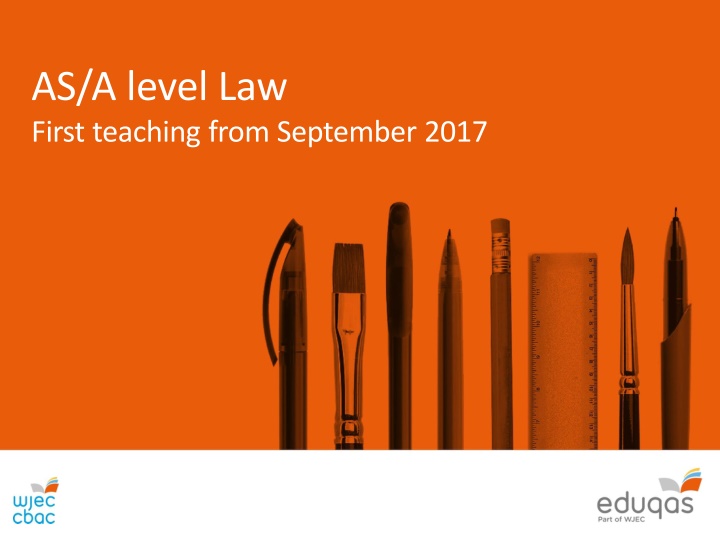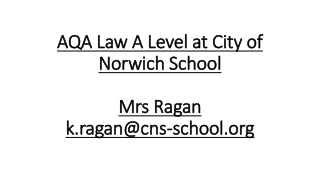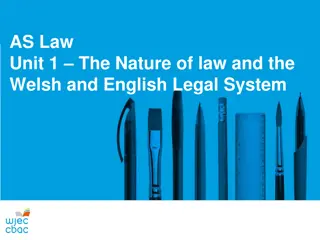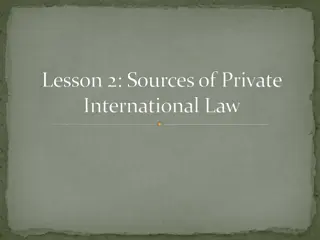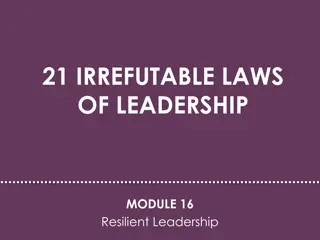AS/A level Law
Introducing Eduqas, the new brand offering reformed GCSEs, AS, and A levels, providing opportunities for flexible teaching approaches and emphasizing high-order skills. The transition to the new specifications includes key changes in qualification requirements for AS and A level Law, with linear assessments and a focus on substantive law areas such as public, criminal, private, human rights, contract, and tort law.
Download Presentation

Please find below an Image/Link to download the presentation.
The content on the website is provided AS IS for your information and personal use only. It may not be sold, licensed, or shared on other websites without obtaining consent from the author.If you encounter any issues during the download, it is possible that the publisher has removed the file from their server.
You are allowed to download the files provided on this website for personal or commercial use, subject to the condition that they are used lawfully. All files are the property of their respective owners.
The content on the website is provided AS IS for your information and personal use only. It may not be sold, licensed, or shared on other websites without obtaining consent from the author.
E N D
Presentation Transcript
AS/A level Law First teaching from September 2017
INTRODUCING EDUQAS In light of the diverging qualifications between England and Wales, WJEC has developed a new brand: Eduqas. Eduqas will be the brand that provides schools with WJEC s newly reformed Ofqual regulated GCSEs, AS and A levels. Eduqas enables teachers to clearly distinguish between legacy qualifications in Wales and reformed qualifications in England. Eduqas qualifications will primarily be available in England but also in Northern Ireland, Isle of Man and the Channel Islands at any schools offering Ofqual regulated qualifications.
KEY FEATURES In developing these specifications, we have been mindful to include the follow features: Opportunities for flexible teaching approaches; Questions designed to enable candidates to demonstrate higher order skills such as knowledge and application; Straightforward wording of questions; Accessibility of materials; Opportunities for breadth of study and subject specific learning and knowledge; High-quality examination and resource materials.
TRANSITION TO THE NEW SPECIFICATIONS First teaching September 2017 AS award Summer 2018 First qualification A level award Summer 2019 Last award of current specification Summer 2018
KEY CHANGES QUALIFICATION REQUIREMENTS AS Law will: Have linear assessments at the end of one year; Comprise two components which will be stand alone and decoupled from the A level; Be co- teachable; Now have more detailed assessment objectives; Explore two areas of substantive law to include one public - criminal law or human rights law and one private - the law of contract or the law of tort
KEY CHANGES QUALIFICATION REQUIREMENTS AS and A level Law will: Now require learners to study three areas of substantive law at least one private law and one public law area; Offer new opportunities for centres to choose areas of substantive law to be studied.
KEY CHANGES QUALIFICATION REQUIREMENTS A level Law will: Have linear assessments at the end of two years; Comprise three components; More detailed assessment objectives Offer three areas of substantive law to include at least - one private - law of contract OR the law of tort - one public - criminal law OR human rights law
AS SUMMARY OF ASSESSMENT Component 1: The Nature of Law and the English Legal System Written exam: 1 hour 30 minutes: 50% of qualification Section A Law making and the nature of law One question from a choice of two data/scenario /stimulus response questions Section B The English legal system and the nature of law One question from a choice of two essay type questions Component 2: Understanding Substantive Law A written exam: 1 hour 30 minutes 50% of qualification Section A Private Law: Law of contract or Law of Tort Section B Public Law : Criminal law or Human Rights Law One question from section A , either on law of contract or on law of tort and One from section B, either on criminal law or on human rights law.
A LEVEL SUMMARY OF ASSESSMENT Component 1: The Legal system and the Nature of Law A written exam: 1 hour 30 minutes 25% of qualification Section A Law making and the nature of law The questions will include short answer and scenario based questions. Section B The English legal system and the nature of law One from a choice of two essay type questions. Component 2: Substantive Law in Practice A written exam: 2 hours 30 minutes 37.5% of qualification One scenario based question from three different sections, selected from: Section A - Law of contract (private law) Section B - Law of tort (private law) Section C - Criminal law (public law) Section D - Human rights law (public law)
A LEVEL SUMMARY OF ASSESSMENT Component 3: Perspectives of Substantive Law Written examination: 2 hours 45 minutes 37.5 of qualification one essay question from three different sections, selected from: Section A - Law of contract (private law) Section B - Law of tort (private law) Section C - Criminal law (public law) Section D - Human rights law (public law)
ASSESSMENT OBJECTIVES Learners must: AO1 Demonstrate knowledge and understanding of the English legal system and legal rules and principles. AO2 Apply legal rules and principles to given scenarios in order to present a legal argument using appropriate legal terminology. AO3 (AS) Analyse and evaluate legal rules, principles and concepts. AO3 (A Level) Analyse and evaluate legal rules, principles, concepts and issues.
ASSESSMENT OBJECTIVES AS A level AO1 AO2 AO3 AO1 AO2 AO3 10% 7.5% 7.5% 20% 15% 15% Comp 1 Comp 1 15% 22.5% - Comp 2 20% 16% 14% Comp 2 15% - 22.5% Comp 3 40% 31% 29% Overall weighting 40% 30% 30% Overall weighting
SUBJECT CONTENT REQUIREMENTS AS Law COMPONENT 1 This component requires learners to demonstrate knowledge and understanding of the nature of law and the English legal system. It focuses on the structure of the English legal system including its relationship with the European Union. Learners will develop knowledge and understanding of sources of primary and secondary law in the English legal system and will consider how those laws are used by judges in making decisions. They will also develop knowledge and understanding of the criminal justice system, civil justice system including relevant legal personnel and legal funding. Coverage of Section A of the component is compulsory. This section focuses on the various methods of law making in the English legal system, including its relationship with the European Union. Coverage of Section B of the component is compulsory. This section focuses on key features of the criminal justice system and civil justice system, including legal personnel and legal funding.
SUBJECT CONTENT REQUIREMENTS AS Law COMPONENT 2 This component will provide learners with the foundation for the study of both private and public law. Learners will required to study two areas of law - one public and one private area. Section A of the component is compulsory and focuses on a chosen area of private law either contract or tort. Learners must demonstrate a range of skills building up from knowledge and understanding, evaluation and application to a legal scenario in relation to their chosen area of private law. Section B of the component is compulsory and focuses on a chosen area of public law, either criminal or human rights. Learners must demonstrate a range of skills building up from knowledge and understanding, evaluation and application to legal scenario in relation to their chosen area of public law. The nature of law and legal skills are pervasive themes throughout this component
SUBJECT CONTENT REQUIREMENTS A Level Law COMPONENT 1 This component requires learners to demonstrate knowledge and understanding of the nature of law and the English legal system. It focuses on the structure of the English legal system including its relationship with the European Union. Learners will develop knowledge and understanding of sources of primary and secondary law in the English legal system and will consider how those laws are used by judges in making decisions. They will also develop knowledge and understanding of the criminal justice system, civil justice system including relevant legal personnel and legal funding. Study of the nature of law is integrated into the content of this component Coverage of Section A of the component is compulsory. This section focuses on the various methods of law making in the English legal system, including its relationship with the European Union. Coverage of Section B of the component is compulsory. This section focuses on key features of the criminal justice system and civil justice system, including legal personnel and legal funding.
SUBJECT CONTENT REQUIREMENTS A Level Law COMPONENT 2 This component will provide learners with the foundation for the study of both private and public law. Learners must study three areas of law, to include either two public and one private or one public and two private. Section A focuses on the law of contract (private law) Section B focuses on the law of tort (private law) Section C focuses on criminal law (public law) Section D focuses on human rights law (public law) This component requires learners to demonstrate knowledge and understanding of the English legal system and legal rules and principles, and break down into constituent parts the relevant legal rules and principles for each area of substantive law and apply those rules to a hypothetical scenario. The nature of law and legal skills are pervasive themes throughout this component.
SUBJECT CONTENT REQUIREMENTS A Level Law COMPONENT 3 For Component 3, learners are required to respond to questions on the same three areas of law as selected for Component 2, to include either two public and one private or one public and two private. Section A focuses on the law of contract (private law) Section B focuses on the law of tort (private law) Section C focuses on criminal law (public law) Section D focuses on human rights law (public law) This component requires learners to demonstrate knowledge and understanding of the English legal system and legal rules and principles, and to analyse and evaluate legal issues by identifying different perspectives, constructing clear, persuasive and logical legal arguments which are substantiated by legal authority. The nature of law and legal skills are pervasive themes throughout this component.
RESOURCES FOR TEACHERS Direct and instant access to a Subject Officer throughout the year. resources.eduqas.co.uk Free digital resources to support the teaching and learning of a broad range of subjects www.wjecservices.co.uk WJEC s secure website has a wealth of resources. You can find CPD material, including PowerPoint presentations on the finer detail of the specifications, exemplar material and past papers and mark schemes.
Any Questions? If you have any questions, please contact our Law subject specialists: Joanna Lewis Subject Officer 02920 265 167 joanna.lewis@eduqas.co.uk Christopher Barfoot Subject Support Officer 02920 265 094 christopher.barfoot@eduqas.co.uk www.eduqas.co.uk @eduqas
